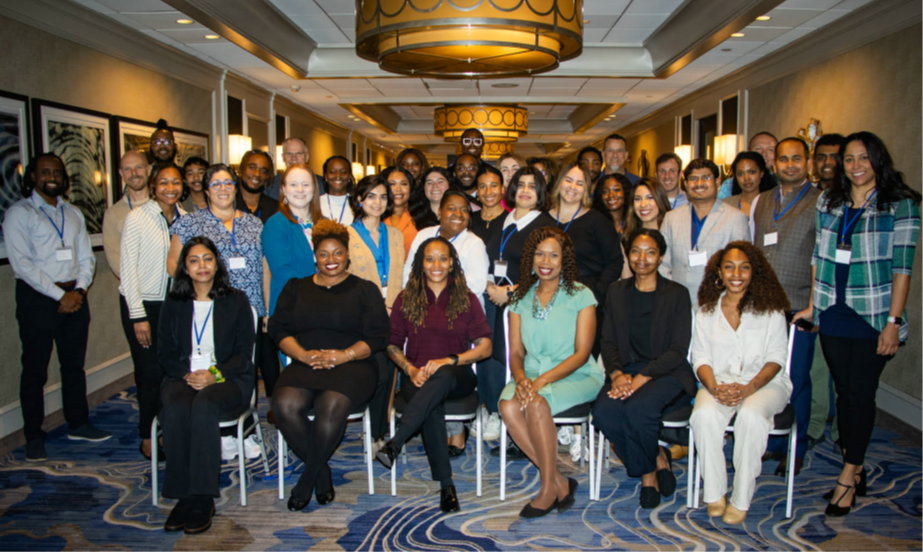On March 7th-10th, Dr. Michelle Dovil (NCAS-M Alumni) was honored to organize and host the National Science Foundation (NSF) Full STEAM Ahead 2024 conference in New Orleans, Louisiana. This conference was the convening of the “Full STEAM Ahead: Powering Connections Among Different Generations of Geoscientists and Social Scientists” project funded by the National Science Foundation (NSF) for $295,885 where Dr. Dovil served as the Principal Investigator for the grant.
Dr. Dovil identifies as an Afro-Latina, gender-fluid, queer academic. She states,
“Growing up in the inner city of Miami, I loved science, math, and language arts. My parents’ commitment to education led me to participate in enrichment programs directed towards black and brown youth and gave me the skills I needed to excel in the sciences. I had no intention of pursuing a doctoral degree. However, in my senior year at the University of Florida, I had the opportunity to take a Women’s Studies course with one of the few Black female professors on campus, Dr. Stephanie Evans, who served as a faculty mentor, encouraged me to participate in the Ronald E McNair program. I vividly remember talking with Dr. Evans, who asked me, “Why I wanted to join the program for research experience, but not pursue a doctoral degree?” I replied without hesitation, “People like me don’t get Ph.Ds.”.
Dr. Dovil immediately learned the value of authentic mentorship. She would later come across several other amazing mentors that would change her life such as Dr. Terri Adams-Fuller, Dr. Ralph Gomes, Dr. Carolyn Stroman, and many more.
The conference had 50 participants from all across the nation, and several had traveled from different countries to attend. It was an opportunity for early career professionals and graduate students to engage in a meaningful conversation about promoting diversity, equity, and inclusion in academia and the workplace. Dr. Dovil kicked off the event on Thursday evening with a Mardi Gras-themed welcome reception where attendees could network and get to know each other—the first full day consisted of panel discussions that focused on professional development, which included career paths after graduate school, negotiating salaries, best practices for networking, and job interviews. The keynote speaker, Dr. Vernon Morris, spoke at length about his experiences as a Black Geoscience student and professional career. His presentation “Geosciencing While Black” (A Redux) left the audience knowledgeable and inspired.
Dr. Morris quoted Bell Hooks, “At the margins are the place of resistance and possibility.” He believes,
“The creativity that we bring as marginalized, isolated, or “othered” individuals is vital to science, creativity, and scientific creativity–whether it’s in the physical sciences, social sciences or the humanities that marginalization is a type of self-empowerment if you flip that challenge it into an opportunity.”
In light of the engaging conversation on the challenges of being a marginalized scientist, the attendees participated in a day dedicated to mental health and wellness that focused on sessions that included Being Enough, Breaking the Silence of Academic Trauma, Microaggressions, Identity outside of Academia and the Workplace, mindfulness affirmations, and a fantastic screening of Dr. Kendall Moore’s “Can We Talk!” Film. The keynote, Dr. Kandis Boyd, started the day by sharing her personal journey to becoming a BIPOC female scientist and the value of preparing yourself mentally for careers in Steam. The participants shared laughs and tears and gained meaningful connections throughout the conference. Dr. Boyd, reminded the attendees,
“Your passion and your personality are perfect for your purpose. Your authenticity will create the steam space not only for today but for tomorrow and for next generations to come.”
The conference was a powerful reminder that authentic conversations, intentional convenings, and a centering of the stories and needs of BIPOC scientists are essential for true advocacy and allyship. We must step up and speak out against biases to achieve equality in STEAM. Creating diverse, equitable, and inclusive spaces must be met with intention and a true commitment to the development of groundbreaking, innovative science. By questioning and addressing these challenges in STEAM and providing solutions, we are creating a more advanced and equitable society.

